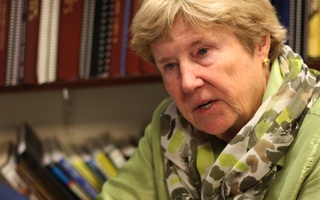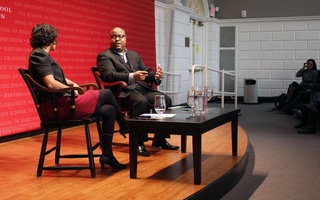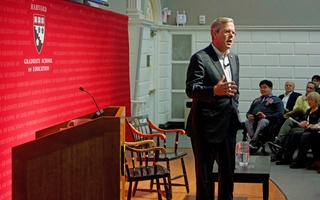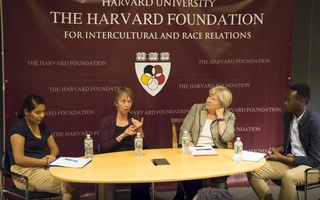Just hours after a bombing attack in Brussels that killed at least 30 people, five faculty members spoke about Harvard’s role in addressing global crises—terror-related and otherwise—on Tuesday evening.
Several dozen people attended the event, the seventh annual installation of the “Harvard Thinks Big” speaker series hosted by the College Events Board, which focused on five issues: educational inequality, income inequality, race relations, terrorism, and climate change.
{shortcode-f4038fe5d01f1966d9027c9e349a12ce89f6c26e}“At the end of the day, it’s our job to do our part to make the world a better place,” Timothy A. Makalinao ’18, who was master of ceremonies for the event, said to the audience at Sanders Theatre .
The CEB chose crisis as its topic because of its relevance to current affairs and its broad applicability to a range of disciplines, according to Harvard Thinks Big co-chair Caleb Spiegel Ostrom ’18.
“We thought it was something that feels very pressing, something that we could build a diverse and interesting event around,” Spiegel Ostrom said of the topic. “It allowed us to bring in professors from a broad range of subjects and fields.”
The faculty members who each spoke for 15 minutes each were Katherine K. Merseth, a senior lecturer on Education; Jennifer L. Hochschild, a Government professor; Brandon M. Terry, a professor of African and African American Studies; Ron Schouten, a Psychiatry professor at the Medical School; and Daniel P. Schrag, a professor of Environmental Science and Engineering.
“I’m leaning a little bit on Harvard students to consider an obligation to make the world a better place,” Merseth, who spoke about education inequality, said in an interview before the event. “I’m very much eager for education to become a topic of greater interest at Harvard College for students.”
In her talk, Merseth emphasized the importance of education in improving the standard of living worldwide.
“I think the education of children and youth is the most important issue that we face today in our society and in our world,” she said. “Consider how you could help ensure a high-quality education for all children.”
Schouten, who briefly made reference to the attacks in Brussels in his remarks, questioned whether all terrorist attacks could be considered acts born out of mental illness.
“After each of the horrific events that are far too numerous, far too depressing to list, people declared that anyone who would do that must be sick, must be crazy,” Schouten said. “As a psychiatrist, I maintain that the vast majority of cases that involve violence do not include mental illness.”
Ankita Sukheja, a student at the Graduate School of Education who attended the talk, said she was attracted to the talk because of an interest in global affairs.
“I’m an international student,” Sukheja said. “We’re more and more becoming a globalized economy all over, so I wanted to know details about the event, so that’s why I’m here.”
–Staff writer Jonathan G. Adler can be reached at jonathan.adler@thecrimson.com. Follow him on Twitter @JonathanGAdler.Read more in College News
Startup Looks to Provide Feedback to UC and Local BusinessesRecommended Articles
-
Education ForumThe first in a series of forums on education will meet at 8 p.m. tonight in Littauer Auditorium. The topic
-
 Ed School To Launch Teacher Fellows Program for College Seniors
Ed School To Launch Teacher Fellows Program for College Seniors -
 Richard Milner Talks Race and Educational Inequality at Forum
Richard Milner Talks Race and Educational Inequality at Forum -
 Jeb Bush Discusses Education Reform, Inequality at GSE
Jeb Bush Discusses Education Reform, Inequality at GSE -
 GSE Professors Argue for Educational Reform During Discussion
GSE Professors Argue for Educational Reform During Discussion













